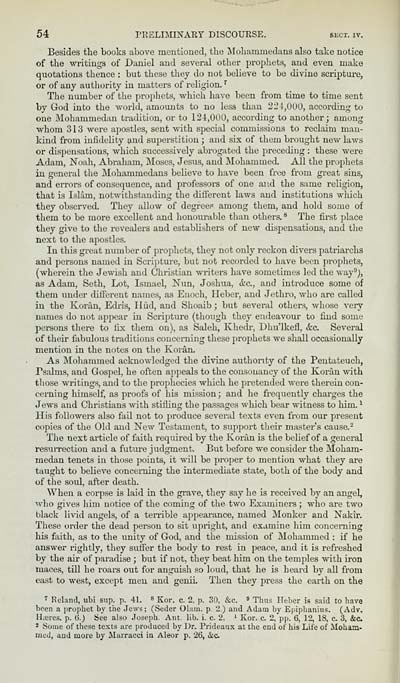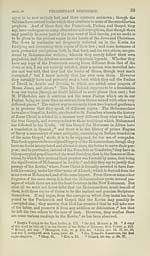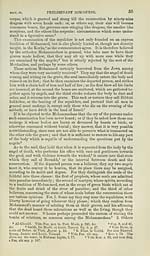Download files
Complete book:
Individual page:
Thumbnail gallery: Grid view | List view

54 PRELIMINARY DISCOURSE, skct. iv.
Besides the books above mentioned, the Mohammedans also take notice
of the writings of Daniel and several other prophets, and even make
quotations thence : but these they do not believe to be divine scripture,
or of any authority in matters of religion. ''
The number of the prophets, which have been from time to time sent
by God into the world, amounts to no less than 224,000, according to
one Mohammedan tradition, or to 124,000, according to another; among
whom 313 were apostles, sent ^vith special commissions to reclaim man-
kind from infidelity and superstition ; and six of them brought new laws
or dispensations, which successively abrogated the preceding : these were
Adam, Noah, Abraham, Moses, Jesus, and Mohammed. All the prophets
in general the Mohammedans believe to have been free fi-om great sins,
and errors of consequence, and professors of one and the same religion,
that is Islam, notwithstanding the different laws and institutions wliich
they observed. They allow of degree." among tliem, and hold some of
them to be more excellent and honourable than others. ^ The first jilace
they give to the revealers and estabHshers of new dispensations, and the
next to the apostles.
In this great number of prophets, they not only reckon divers patriarchs
and persons named in Scri])ture, but not i-ecoi*ded to have been prophets,
(wherein tlie Jewish and Christian wi'iters have sometimes led the way^),
as Adam, Seth, Lot, Ismael, Nun, Joshua, ifec, and introduce some of
them under different names, as Enoch, Heber, and Jethro, who are called
in the Konln, Eth-is, Hud, and Shoaib ; but several others, whose very
names do not appear in Scripture (though they eiideavour to find some
persons tliere to fix tliem on), as Saleh, Khedi', Dhu'lkefl, (fee. Several
of their fiibulous traditions concerning these prophets we shall occasionally
mention in the notes on the Koran.
As Mohammed acknowledged the divine authority of the Pentateuch,
Psalms, and Gospel, he often appeals to the consouancy of the Koran with
tliose wi'itiugs, and to the prophecies which he i)retended were therein con-
cerning himself, as proofs of his mission; and he frequently charges the
Jews and Christians with stifling the passages which bear witness to him. ^
His followei"s also fail not to produce several texts even from our present
copies of the Old and New Testament, to support their master's cause.-
Tlie next article of faith required by the Kortln is the belief of a general
resuiTCction and a future judgment. But before we consider the Moham-
medan tenets in those points, it will be proper to mention what they are
taught to believe concerning the intermediate state, both of the body and
of the soul, after death.
When a corpse is laid in the grave, they say he is received by an angel,
who gives him notice of the coming of the two Examinei-s ; who are two
black livid angels, of a temble ajipearance, named INIonker and Nakir.
These order the dead person to sit upright, and examine him concerning
his faith, as to the unity of God, and the mission of Mohammed : if he
answer i-ightly, they suffer the body to rest in peace, and it is refreshed
by the air of paradise ; but if not, they beat him on the temples with iron
maces, till he roars out for anguish so loud, that he is heard by all from
east to west, except men and genii. Then they press the earth on the
T Reland, ubi sup. p. 41. 8 Kor. c. 2, p. 30, Sec. » Thus Heber is said to liave
been a prophet by the Jews; (Seder Ohiin. p 2.) and Adam by Epiphanius. (Adv.
H;cres. p. d.) See also Joseph. Ant. lib. i. c. 2. ^ Kor. c. 2, pp. 6, 12, 18, c. 3, &c
* Some of these texts are produced by Dr. Phdeaux at the end of his Life of Moham-
med, and more by Marracci in Aleor p. 26, &c
Besides the books above mentioned, the Mohammedans also take notice
of the writings of Daniel and several other prophets, and even make
quotations thence : but these they do not believe to be divine scripture,
or of any authority in matters of religion. ''
The number of the prophets, which have been from time to time sent
by God into the world, amounts to no less than 224,000, according to
one Mohammedan tradition, or to 124,000, according to another; among
whom 313 were apostles, sent ^vith special commissions to reclaim man-
kind from infidelity and superstition ; and six of them brought new laws
or dispensations, which successively abrogated the preceding : these were
Adam, Noah, Abraham, Moses, Jesus, and Mohammed. All the prophets
in general the Mohammedans believe to have been free fi-om great sins,
and errors of consequence, and professors of one and the same religion,
that is Islam, notwithstanding the different laws and institutions wliich
they observed. They allow of degree." among tliem, and hold some of
them to be more excellent and honourable than others. ^ The first jilace
they give to the revealers and estabHshers of new dispensations, and the
next to the apostles.
In this great number of prophets, they not only reckon divers patriarchs
and persons named in Scri])ture, but not i-ecoi*ded to have been prophets,
(wherein tlie Jewish and Christian wi'iters have sometimes led the way^),
as Adam, Seth, Lot, Ismael, Nun, Joshua, ifec, and introduce some of
them under different names, as Enoch, Heber, and Jethro, who are called
in the Konln, Eth-is, Hud, and Shoaib ; but several others, whose very
names do not appear in Scripture (though they eiideavour to find some
persons tliere to fix tliem on), as Saleh, Khedi', Dhu'lkefl, (fee. Several
of their fiibulous traditions concerning these prophets we shall occasionally
mention in the notes on the Koran.
As Mohammed acknowledged the divine authority of the Pentateuch,
Psalms, and Gospel, he often appeals to the consouancy of the Koran with
tliose wi'itiugs, and to the prophecies which he i)retended were therein con-
cerning himself, as proofs of his mission; and he frequently charges the
Jews and Christians with stifling the passages which bear witness to him. ^
His followei"s also fail not to produce several texts even from our present
copies of the Old and New Testament, to support their master's cause.-
Tlie next article of faith required by the Kortln is the belief of a general
resuiTCction and a future judgment. But before we consider the Moham-
medan tenets in those points, it will be proper to mention what they are
taught to believe concerning the intermediate state, both of the body and
of the soul, after death.
When a corpse is laid in the grave, they say he is received by an angel,
who gives him notice of the coming of the two Examinei-s ; who are two
black livid angels, of a temble ajipearance, named INIonker and Nakir.
These order the dead person to sit upright, and examine him concerning
his faith, as to the unity of God, and the mission of Mohammed : if he
answer i-ightly, they suffer the body to rest in peace, and it is refreshed
by the air of paradise ; but if not, they beat him on the temples with iron
maces, till he roars out for anguish so loud, that he is heard by all from
east to west, except men and genii. Then they press the earth on the
T Reland, ubi sup. p. 41. 8 Kor. c. 2, p. 30, Sec. » Thus Heber is said to liave
been a prophet by the Jews; (Seder Ohiin. p 2.) and Adam by Epiphanius. (Adv.
H;cres. p. d.) See also Joseph. Ant. lib. i. c. 2. ^ Kor. c. 2, pp. 6, 12, 18, c. 3, &c
* Some of these texts are produced by Dr. Phdeaux at the end of his Life of Moham-
med, and more by Marracci in Aleor p. 26, &c
Set display mode to: Large image | Transcription
Images and transcriptions on this page, including medium image downloads, may be used under the Creative Commons Attribution 4.0 International Licence unless otherwise stated. ![]()
| Early Gaelic Book Collections > J. F. Campbell Collection > Koran: or, Alcoran of Mohammed > (76) |
|---|
| Permanent URL | https://digital.nls.uk/77134931 |
|---|
| Description | Volumes from a collection of 610 books rich in Highland folklore, Ossianic literature and other Celtic subjects. Many of the books annotated by John Francis Campbell of Islay, who assembled the collection. |
|---|
| Description | Selected items from five 'Special and Named Printed Collections'. Includes books in Gaelic and other Celtic languages, works about the Gaels, their languages, literature, culture and history. |
|---|

